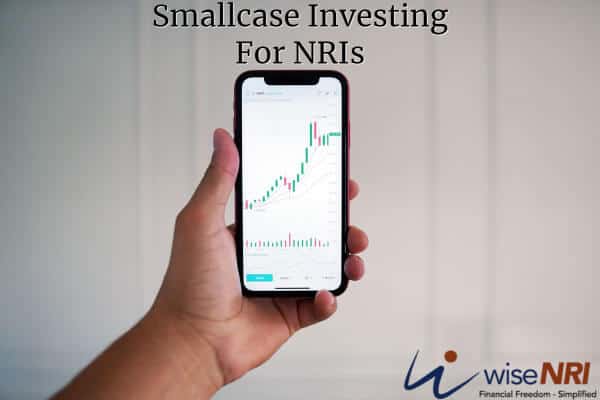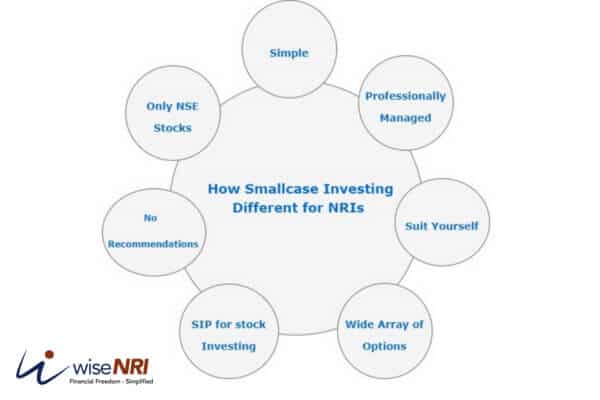Direct investors of stock markets have always been attracted towards theme-based investing – be it a dividend, cyclical, small and mid-caps, or a sectoral theme. To build a portfolio of such stocks, they had no choice till a few years ago. They had to either find and buy individual stocks related to their theme of choice, one scrip at a time; or they had to invest in mutual funds schemes that matched their ideas and themes.
But with the launch of Smallcase for retail investors in 2016 changed it. The “smallcase” is a Bengaluru-based fintech startup, founded in 2015, and offers readymade portfolios of stocks based on the principles of portfolio-investing. According to their own blog, “portfolio-based investing is more beneficial for direct stock investors, instead of concentrated bets in 1 or 2 stocks.”
Note: This article is not an advice to invest in stocks or using any particular platform like smallcase – talk to your Financial Planner before taking any action. (We DO NOT recommend “direct stock” investing to most of our clients)

Read- How Can NRI Investment in Indian Stock Market?
Smallcase for NRI are specially curated portfolios based on a theme allowing investors to put their money where their mouth is. To put it simply, a smallcase is a “basket” of stocks that have a common idea, theme, sector, objective, or strategy connecting them.
More than 65 SEBI-licensed research analysts and advisors manage 250+ publicly available smallcases, in which one can invest via 12 leading broking houses.
How Smallcase For NRI Different?
Simple
Each smallcase is built around a simple-to-understand idea that any DIY investor can grasp.
Professionally managed
The 250+ publicly available smallcases are designed and curated by leading financial experts and stock-pickers backed by data-driven research and analysis.
Suit yourself
Each smallcase is fully customizable as an investor can add or remove the constituents of the smallcase at any time. They can even create a new smallcase.
Wide array of options
The 250+ smallcases are divided into more than 15 categories to easily help you find the smallcase that fits your own idea the best. They are further categorized based on volatility levels & investment value.
Check- Wealth Planning Checklist for NRIs
SIP for stock investing
With smallcase you can bring discipline to your investments and start SIPs with weekly, monthly, or quarterly intervals.
No Recommendations
A Smallcase is not a recommendation to buy, hold or sell any stock or portfolio of stocks at a given time. it is just a smallcase – a portfolio or a basket of stocks with pre-defined weights. It means you still have to decide when to buy or sell.
Only NSE Stocks
As of now, stocks listed only on NSE can be part of a smallcase on the platform. This leaves out many scrips that trade only on BSE, but still covers around 95% universe of listed stocks.
How Does Smallcase Investment in India Work?
The smallcase app and website integrate with leading brokers to trade on the NSE and enable one-click transactions in a basket of stocks and ETFs. Each stock and ETF has a pre-defined weight in the ‘smallcase’ defined by the manager of the smallcase.
Many of these portfolios are available for as low as Rs. 5,000 – one of the biggest reasons for their popularity among retail investors in India. The portfolios are also named to reflect the idea behind the smallcase and attract investors. Sample a few of them:
- All-Weather Investing
- Digital Businesses
- Dividend Aristocrats
- Momentum Stocks
- House Of Tata
- Global Opportunities
- Rising Rural Demand
Smallcase investment in India has three parts to it:
- Investing – You can buy a smallcase either using a lump-sum investment or start a SIP. All the constituent stocks would be automatically added to your Demat account.
- Tracking – Tracking your investments for overall performance, dividends, and corporate actions.
- Managing – Only SEBI-registered investment advisors can create and manage public smallcases.
When a smallcase basket is rebalanced by the manager, you can either continue with the original allocation or choose to apply the changes.

Read – 401K India
How can NRIs invest in Smallcase?
Like any other stock, NRIs need to have a Demat account with one of the 12 broking houses that offer Smallcase Investing in India opportunities, linked to their NRE or NRO accounts. They need to complete the required KYC and FACTA compliance before making any investments. Check – Portfolio Investment Scheme or PIS account for NRIs
Intraday trades
NRIs cannot make an intraday trade. Smallcase rebalancing involves simultaneous buying and selling of portfolio stocks. If an NRI has multiple smallcases with the same stock – where it is bought in one and sold in another – s/he would have unfilled orders. Though you can ‘repair’ such unfilled orders on the next business day, you could lose money due to the price differential.
Restricted stocks
The Reserve Bank of India has placed different limits on different companies in which NRIs, PIOs, OCIs, and FIIs can invest. So, you must check the RBI list before making any investment in a smallcase with such company.
Availability of funds
If the cash realized is not sufficient, then investor needs additional funds for rebalancing. The clearance of funds from NRI accounts, however, can take a few working days, resulting in unfilled orders for that long.
Costs
Investors need to pay a research fee to the smallcase manager as a percentage of the investment amount or as a flat fee. The smallcase charges the managers a part of their fee for using the platform.
Taxes
As you are dealing in direct equity, the same taxation rules apply:
- Long-term capital gains are taxed at 10% if such gains exceed Rs. 1 lakh/year.
- Short-term capital gains are taxed at 15% of the total gains.
- For smallcases dealing in ETFs, the taxation depends on each ETF individually.

Must Read – Mis-selling of Expensive Insurance to NRIs
Pros and cons of Smallcase investing by NRIs
On the pros side, the ease of use, control, thematic investments, diversification, etc. all seem to be very compelling reasons to own a smallcase. Smallcase offers an investor a greater degree of control compared to a mutual fund scheme as you can make edits to the smallcase suggested to you. Any rebalancing in the portfolio is also transparent and requires your explicit approval.
But there are many caveats, if not cons, also that one must never ignore:
- Do you really believe that all smallcase managers have access to the research and financial acumen of a large fund house?
- Thematic investing has its many perils – like what if the theme fails or what of some other theme is more successful.
- Direct exposure to stocks is suited for those individuals who have the time and inclination, and can put in extra efforts to research individual stocks. If you lack any one of these, then direct equities – whether through smallcase – is not for you.
- The tax incidence would be higher as your portfolio would be adjusted – stocks sold and bought – when the managers update the basket. And as you don’t have time to study separately, most of you by default opt for automatic adjustment.
- The rebalancing and fund settlement through your NRI accounts may take 1 to a few days. During this time as the stock prices would change, you may lose the advantage.
- There is a risk of concentration – as all stocks in a smallcase may belong to a limiting theme or sector – and when the sector would underperform, so would your portfolio.
- Smallcase has only witnessed a sustained bull market that has seen only new heights every year, except for a short blip in March 2020. The real test of the resilience of any stock-picking strategy is in a long bear market.
In all, we would recommend Smallcase investment in India only for the really adventurous, who have dabbled in direct equities earlier, and now are looking for something more. If you are a first-time investor, or cannot find the time or inclination to research each stock (even as part of a basket), then direct equity investing is not for you.
If you have any questions related to smallcase or direct stock investing – add in the comment section.

How can i open account as an NRI?
Can NrI invest in small case
Hey Alex,
Yes, NRIs (Non-Resident Indians) are generally allowed to invest in platforms like Small case, subject to certain regulations and guidelines set by the Reserve Bank of India (RBI) and the Securities and Exchange Board of India (SEBI).
Which small case are allowed for Nri in USA
Is there an app that I can download and what is the name of the app
Hello Pratyush,
thank you for msg.
There are many apps on Google like 5pasia, HDFC, Kotak Sec. , and Upstox.
Is it wise to invest in smallcase looking at the Brokerage charges paid of .5%+other charges?
Hey mathews,
Investing in smallcases can be beneficial as they offer diversified portfolios and thematic investment options. However, the decision depends on individual preferences and investment goals. Considering brokerage charges of 0.5% and other fees, assess the potential returns, diversification benefits, and alignment with your investment strategy to determine if the service justifies the costs for you. Evaluate these factors against your investment objectives before making a decision.
I am a NRI in London can i invest in small case
Hello Gladwin
Thank you for msg
yes, you can invest in a small case. you will need to open a Demat account with a SEBI-registered brokerage firm,
I want to know how I could start a trading small case account in nri investment in Indian stock market??
Hi Stephy,
NRIs need to have a Demat account with one of the 12 broking houses that offer Small case Investing in India opportunities, linked to their NRE or NRO accounts. They need to complete the required KYC and FACTA compliance before making any investments
The Reserve Bank of India has placed different limits on different companies in which NRIs, can invest. So, you must check the RBI list before making any investment in a small case with such company.
I have NRO account, can i invest in small case in India.
Hi Harsha,
Yes, NRI can purchase shares or convertible debenture of an Indian Company through stock exchanges, under the portfolio investment scheme on repatriation and /or non repatriation basis
Can I invest in smallcase from UAE
Hi Nadeali,
As per my knowledge, Yes, You can invest.
Can I open an smallcase as NRI directly or I have to buy using my Demat a/c with the broker
Hi Constancio,
To invest in a small case, one requires a Demat and trading account.
I have an demat ac with Axis.
However lately I bought 7 different Adhani group shares. And for each scrip Axis charged me minimum 50 INR.
So for 7 script I ended up paying 350. Imagine you have to pay 50INR for 1 share of Adhani Ent so your cost increasing enormously each time I use small case through Axis…is there any other solution to reduce the cost
I have a DMAT account linked to my NRI Account in the HDFC bankCan I ur this for small case investment here
Hi Arun,
Yes, you can use it.
can ICICI direct nri account invest through smallcase
Hi Avneet,
Yes.
Hi if NRI can open an account in small case?
Hi Mathews
Yes, you can open account in small case
Hi Mathews
Yes by opening Demat account with one of the 12 broking houses that offer Smallcase Investing in India opportunities, linked to their NRE or NRO accounts.
Yes
Is small case available for NRIs
Hi Ramakrishnan,
Yes. But Intraday trading is not available for NRI.
Can NRIs invest in smallcases sitting in USA
Hi Anwarali,
Yes.
Can non indian use small case?
Hi Namrinchey,
Yes, A non Indian can use small case
Can nri open online free demat account
Hii Ravi
Yes NRI can open demat account, they would require a Portfolio Investment Scheme approval from RBI
I did invest in small cases and every three months they rebalance and recommend buying new stocks or sell some stocks which I end up with a big loss after two years and also I had to deal with the short-term tax issue due to their rebalancing of the portfolio.
Thanks Shiva for sharing your experience.
Thanks for your useful article. Can you provide details of what you have mentioned therein vide below:
“Like any other stock, NRIs need to have a Demat account with one of the 12 broking houses that offer Smallcase Investing in India opportunities, linked to their NRE or NRO accounts.”